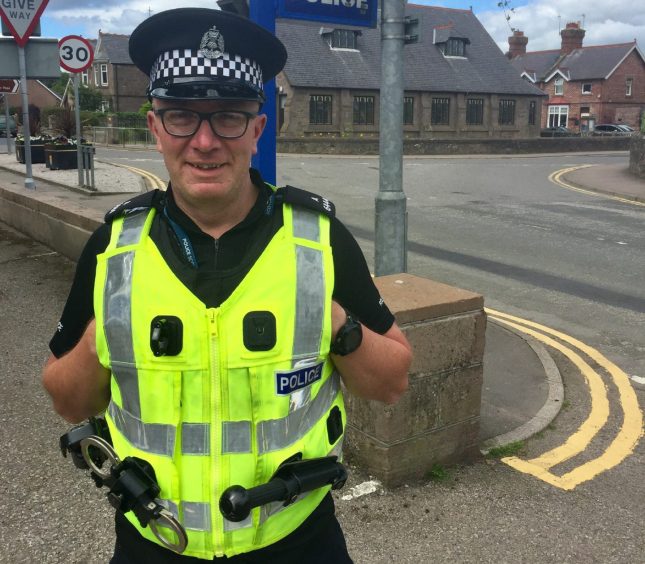An Aberdeen pensioner was saved from an elaborate bank scam after an alert system sprang into action.
The man, in his 80s, was in his Aberdeen home when he was targeted by an organised crime gang.
Such is the efficiency of a recently introduced ‘red flag’ system that the man’s life savings were protected – and police have now made the system even better.
In one case where the Banking Protocol system worked, scammers phoned their victim and said his bank account was at risk.
Two days later, the gang sent an accomplice to the man’s door purporting to be a ‘bank representative’ who could solve the victim’s problems.
£10,000 scammers thwarted
Believing him to be genuine, the victim handed over his bank card and pin number to the crooks.
The criminals then tried to transfer upwards of £10,000.
But a bank worker who was specially trained under the Banking Protocol became suspicious and halted the transaction.
The gang were left empty-handed but have not yet been traced.
Staff at Virgin Money alerted police who are still investigating the attempted fraud.
The pensioner, who asked not to be named, said: “The bank staff noticed immediately there was something wrong and helped me immensely.
“I would like to express my sincere thanks to the bank staff at Virgin Money and the police officers who subsequently attended.”
Detectives said about 10 or so of these frauds are happening in the north-east every month and they are determined to clampdown.
Just a few days ago we reported how scammers conned an 84-year-old Mastrick woman out of at least £1,000.
And we recently reported on two other similar incidents.
New system in action
So officers are recalibrating an information-sharing system traditionally used in a different way.
The existing system, for example, allows police who receive a report from a child to share information with their school so staff can provide the correct support.
That system is now being utilised to target bank scammers.
Speaking ahead of Adult Support Protection Awareness Day on Thursday, Detective Constable Tom Cameron explained how it works.
He said: “The information-sharing system exists and is useful, but we were noticing it didn’t help people meeting certain criteria.
“It could be someone whose husband or wife has recently died.
“The person who has passed on maybe used to deal with all the family finances and all of a sudden it’s been passed on to the surviving spouse.
Protecting the bereaved
“Now, we may come into contact with that person and pass their details to the bank.
“We can say ‘look, this customer has recently been bereaved’ and the banks put a note on the system.
“That note might pop later and instruct the staff member to just be a wee bit more wary.”
He added: “They can also add extra mechanisms onto the account so that something can’t happen.
“You may have someone who is elderly and has never used online banking before and has no capacity to do so but then all of a sudden their account is set up for online banking – that would be a red flag.
“We’re in the process of rolling this out across the division.”
DC Cameron said banks were 100% on board with the new system and are using it themselves.
Banks doing their bit too
He said: “For example, if a customer comes into the branch and the staff have a wee concern about them – maybe they are seeing a bit of a decline in their health or they are coming in less kempt than previously – they will use the same process.”
That means bank staff can alert police, GPs and others so notes are attached to the files of vulnerable people who can look for danger signs.
Details of the fraud mentioned earlier in the article have been shared with the victim’s GP, who can then keep an eye on any declining health.
At the heart of this drive to combat bank fraud is the proactive work of police who visit bank branches weekly.
They visit branches so often that on two occasions recently officers were actually in the branches while attempted frauds were being committed.
Patrol catches fraud in the act
PC Mike Urquhart, of the North East Crime Reduction Team, said: “We go out and talk to every community group we can engage with.
“We work with almost every bank in the north-east, going in to talk to the bank staff and customers and giving them advice.
“We’ve actually been in branches when potential frauds have been coming in and have been able to stop them there and then.”
DC Cameron: “In one instance last year, a customer made an appointment to go into the bank.
“We were in the branch at the time as this customer was trying to withdraw a large sum of money for gardening work and it turned out it was a fraud.
“We were able to stop it there and then as we just happened to be there that day.
“However, I believe the Banking Protocol would have stopped it anyway.”
Throughout this week, PC Urquhart and his colleagues plan to speak to members of the public in banks, libraries, GP surgeries and pharmacies and on the street.
“Pharmacies are going to put anti-crime leaflets into prescription bags, so when prescriptions get handed out to older, more vulnerable people – it’s another way to reach them,” said PC Urquhart.



